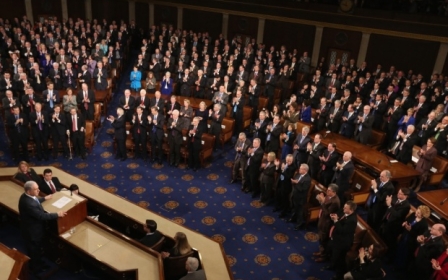US Republicans slam Iran deal

US Republicans expressed scepticism about Thursday's deal to curb Iran's nuclear programme, with House Speaker John Boehner demanding Congress be allowed to review the accord before crippling economic sanctions are lifted.
Several House and Senate members expressed cautious optimism about what President Barack Obama called a "historic understanding" reached between six world powers and Iran, a deal he assured would, if followed, prevent Iran from developing a nuclear bomb.
Boehner slammed it as an "alarming departure" from the White House's initial goals, suggesting the Obama administration caved to Iranian negotiators and allowed certain concessions.
"My immediate concern is the administration signalling it will provide near-term sanctions relief," Boehner said in a statement.
"Congress must be allowed to fully review the details of any agreement before any sanctions are lifted."
“After visiting with our partners on the ground in the Middle East this week, my concerns about Iran’s efforts to foment unrest, brutal violence and terror have only grown,” he added, according to the Washington-based newspaper The Hill. Boehner this week led Republican leaders on a trip through Israel, Jordan, Saudi Arabia, and Iraq.
“It would be naïve to suggest the Iranian regime will not continue to use its nuclear program, and any economic relief, to further destabilize the region,” Boehner said.
According to parameters released by the White House, sanctions on Iran will be suspended "after the IAEA (International Atomic Energy Agency) has verified that Iran has taken all of its key nuclear-related steps," but they could snap back into place if Iran fails to fulfil its commitments.
Senator Mark Kirk, among the most hawkish Republicans on Iran and co-author of legislation that tightens sanctions, minced no words in reacting to the agreement.
"Neville Chamberlain got a better deal from Adolf Hitler," Kirk sneered, referring to the 1930s British prime minister and his disastrous policy of Nazi appeasement.
Obama starkly warned lawmakers that if Congress "kills this deal ... then it's the United States that will be blamed for the failure of diplomacy."
Republican 2016 presidential hopefuls challenged the accord's viability.
Former Florida governor Jeb Bush described the agreement as "flawed", arguing it included "significant concessions to a nation whose leaders call for death to America and the destruction of Israel".
"Nothing in the deal described by the administration ... would justify lifting US and international sanctions," Bush said.
Former Texas governor Rick Perry said on Twitter that Americans have a right to be wary of a deal "riddled with concessions by the Obama administration," while Senator Marco Rubio warned that Iran being able to keep 6,000 of its 19,000 centrifuges indicates "that this deal is a colossal mistake."
Senate Foreign Relations Committee chairman Bob Corker urged lawmakers to "remain clear-eyed" about Iran, and reiterated his insistence that Congress review any final deal.
Corker introduced legislation that would compel Obama to run the accord past Congress.
He said there was "growing bipartisan support for congressional review of the nuclear deal," adding he was "confident of a strong vote on the Iran Nuclear Agreement Review Act" when his committee takes it up on 14 April.
Senate Democrat Robert Menendez also backed congressional action.
"If diplomats can negotiate for two years on this issue, then certainly Congress is entitled to a review period of an agreement that will fundamentally alter our relationship with Iran and the sanctions imposed by Congress," he said.
Senate Minority Leader Harry Reid said he was cautiously optimistic about the deal, and warned against "rash action" in Congress.
"In the coming days and weeks, we should all take a deep breath, examine the details and give this critically important process time to play out," he said.
Arkansas Senator Tom Cotton, who wrote a controversial letter to Iranian leaders last month, also weighed in on the deal.
“Iran remains the world’s worst state sponsor of terrorism. Iranian aggression is destabilizing the Middle East. And Iran continues to hold multiple Americans hostage,” The Hill quoted Cotton as saying.
“I will work with my colleagues in the Senate to protect America from this very dangerous proposal … and to stop a nuclear arms race in the world’s most volatile region.”
Stay informed with MEE's newsletters
Sign up to get the latest alerts, insights and analysis, starting with Turkey Unpacked
Middle East Eye delivers independent and unrivalled coverage and analysis of the Middle East, North Africa and beyond. To learn more about republishing this content and the associated fees, please fill out this form. More about MEE can be found here.




